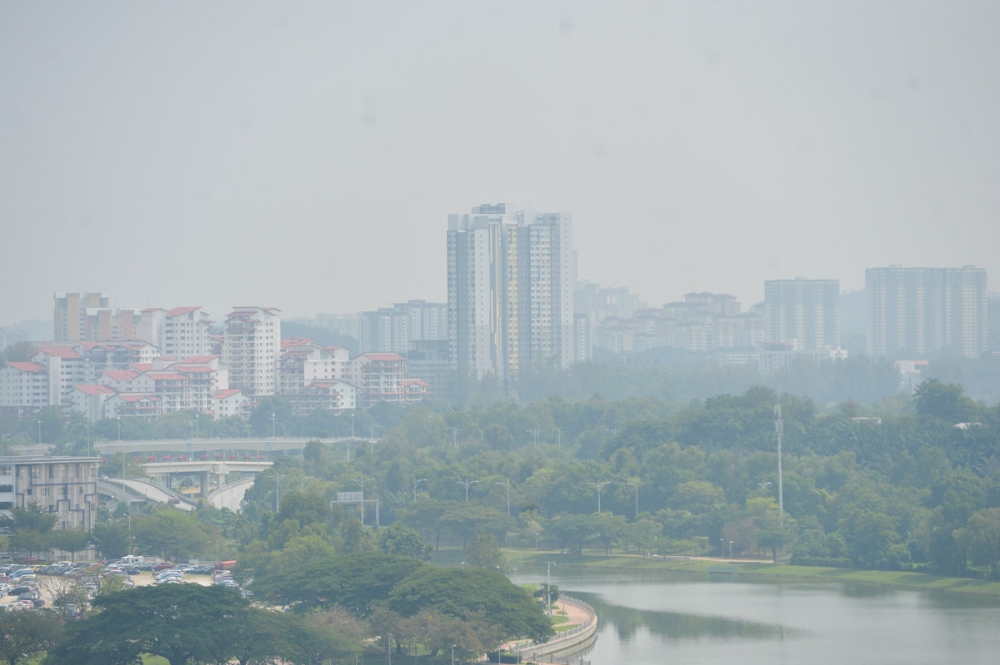Haze pollution in Malaysia: Holding Malaysian oil palm companies accountable through ESG reporting — Jayaprakash Murulitharan

OCTOBER 5 — In recent days, we’ve witnessed compelling evidence provided by the Asean Meteorological Center (ASMC) pinpointing hotspots in Sumatera and Kalimantan, along with detailed wind direction and speed data, all of which unequivocally point to the source of the haze. However, Indonesia has contested ASMC’s claims, presenting its imagery from the Meteorology, Climatology, and Geophysics Agency (BMKG) regarding hotspot activity.
This contentious issue has persisted for over a decade, particularly gaining prominence since Indonesia’s ratification of the Asean Agreement on Transboundary Haze Pollution (AATHP) in 2015. Initially established in 2002, the AATHP was designed as a multilateral Asean platform to prevent and monitor transboundary haze pollution, mainly from land and forest fires within the region. Sadly, despite its noble intentions, this agreement has failed to yield significant success in providing effective solutions for preventing haze in the Asean region.
While Malaysians often engage in internal debates about their government’s actions concerning the transboundary environmental crisis, the urgency of the current haze situation demands immediate attention within Malaysia. Malaysia now faces a pivotal moment where it must seriously consider measures to hold those responsible for this environmental catastrophe accountable, including imposing substantial financial penalties on the perpetrators.
Amidst the seemingly never-ending disputes among Asean bureaucrats and the relentless persistence of haze in the region, Malaysia finds itself at a crossroads. While the transboundary nature of the problem makes it complex, Malaysia could take a decisive stance against Malaysian entities operating in Indonesia, particularly those within the oil palm sector. Unlike the usual approach of implementing a transboundary pollution act, which often becomes a political tool and faces limited success due to challenges obtaining sovereign information from the countries where the fires originate, Malaysia could explore alternative strategies.
Singapore’s persistent advocacy for such measures within Asean, exemplified by its enactment of the Haze Pollution Act, has shown that even proactive efforts might yield few prosecutions. A haze transboundary pollution act has its challenges in implementation due to inability in obtaining sovereign information from the countries where the fires originate Enacting a similar approach in Malaysia might seem politically favourable. Still, it could backfire if our government remains unable to prevent the occurrence of fires. Therefore, Malaysia should consider innovative methods that go beyond traditional legislation.
Indeed, the government in Malaysia can pursue a more localised and impactful approach by focusing on the tangible effects of these fires on Malaysians in Malaysia, particularly those caused by Malaysian oil palm operators in Sumatera and Kalimantan. Studies have revealed that 80 per cent of fires during haze are set by oil palm plantation companies while the remaining 20 per cent is due to slash and burn practices by local villagers.
Statistically, Indonesia’s agency has shown that 332 palm oil companies operating in the country have foreign investors. Almost all major Malaysian oil palm companies have investments in Sumatera and Kalimantan, with land holdings ranging from 20,000 ha to 150,000 ha. While these Malaysian companies are based in Malaysia, they must maintain Indonesian subsidiaries in compliance with local business regulations. It is a well-established fact that Malaysian oil palm companies often engage in partnerships or joint ventures with Indonesian firms, allowing Malaysian stakeholders to distance themselves from majority shareholding and shifting responsibility. A common claim by oil palm operators in Indonesia is that fires originate from villagers’ land near oil palm plantations, citing a 2007 law mandating that 20 per cent of agricultural land be allocated to local villagers.
Rather than persisting with futile attempts to extinguish the fires entirely, Malaysia can take a more pragmatic approach by holding its oil palm plantation operators in Indonesia accountable for their actions and promoting responsible land management, particularly during fire events that result in haze in Malaysia.
A promising avenue to realise this accountability is for government agencies and civil societies in Malaysia to rigorously assess the Environmental, Social, and Governance (ESG) reports submitted by Malaysian oil companies operating abroad, particularly emphasising activities in Sumatera and Kalimantan. ESG reporting has been mandatory for Malaysian companies listed on Bursa Malaysia since 2016. The ESG reports should be subject to meticulous auditing scrutinising the management of Malaysian oil palm plantations in Indonesia in previous years and the present year, 2023.
By closely examining the ESG reports submitted to Bursa Saham, Malaysian stakeholders can attain a more precise and transparent understanding of the land management practices of these operators. This scrutiny can exert significant pressure on oil palm companies in Malaysia to assume greater responsibility for managing their land and local villagers’ lands. Furthermore, it provides a platform for these companies to present their initiatives and address the challenges they’ve encountered. ESG reports should not be relegated to mere bookshelf ornaments. Malaysian government agencies should leverage these reports to scrutinise the activities of major oil palm companies holding land in Sumatera and Kalimantan.
Acknowledging that fires can have various origins, including forested and oil palm plantation areas, and that disputes regarding smoke transport to Malaysia may persist, Malaysians can still take action to hold oil palm operators accountable for their land management practices in Indonesia. This accountability can be achieved through rigorous ESG report auditing, providing a means to scrutinise and monitor these regional operators’ responsible land management efforts.
ESG auditing for palm oil companies represents a promising shift in addressing the ongoing haze crisis. This approach not only holds the relevant parties accountable for fires on their sites but also empowers Malaysians to become critical stakeholders in mitigating these fires and ensuring that Malaysian operators are held responsible. It creates a joint responsibility platform where government agencies and the public can actively participate in reducing the impact of these destructive fires. By utilising ESG reporting and robust auditing processes, we can make tangible strides toward a more transparent and accountable approach to tackling the haze crisis, ultimately benefiting the environment and public health in the region.
*Jayaprakash Murulitharan is a PhD Researcher (Atmospheric Science) at the University of Cambridge.
**This is the personal opinion of the writer or publication and does not necessarily represent the views of Malay Mail.
